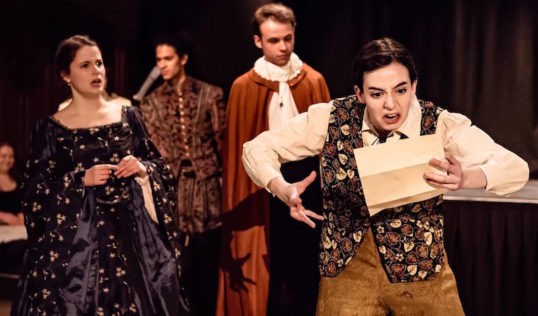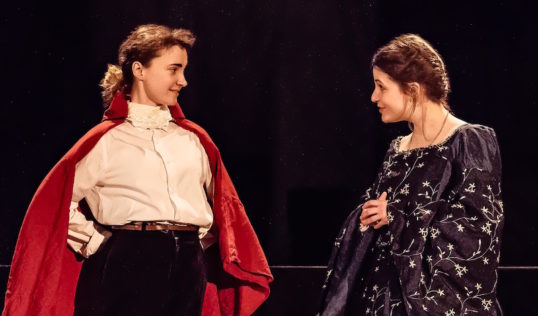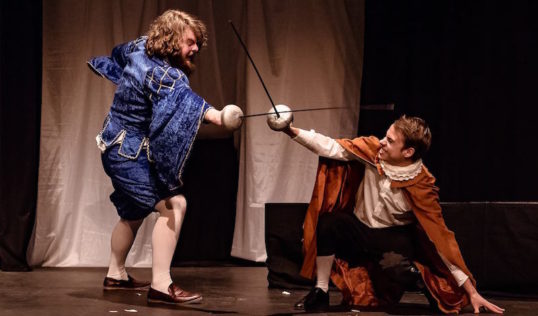Twelfth Night
★★★★☆ Cleanly put
Teviot House: Tue 21 – Sat 25 March 2017
Review by Thom Dibdin
Solidly performed and cleverly directed, there is much to enjoy about Edinburgh University Shakespeare Company’s lucid production of Twelfth Night at Teviot House to Saturday.
This is already a comedy which uses gender and cross dressing to drive the plot when shipwrecked twin Viola dresses up as her brother (who she believes drowned), and director Lauren Stockless makes clever use of this in both her casting and her directorial choices.
First of all, however, it is important to acknowledge the clarity with which the thoroughly convoluted plot is delivered.
Viola, now calling herself Cesario, starts working for Duke Orsino, acting as his go-between in his wooing of pious and recently bereaved Olivia. But while Olivia rejects Orsino’s advances out of hand, she believes Olivia’s fiction and falls for her as Cesario.
This being a proper love triangle, Viola’s own eye now turns towards Orsino but, as she is in the guise of Cesario, she can’t declare her love. She does, however, drop more than enough hints in the cut and the thrust of Shakespeare’s wordplay to indicate that all is not as it might seem.
All three are played with strength and in service of the plot. Olivia Evershed’s Viola turns into a callow Cesario. Evershed makes it easy to believe Cesario’s witty tongue and the attractiveness of his self-deprecating attitude.
commanding presence
Francesca Sellors is a stately Olivia. She has a commanding presence and, if her falling for Cesario is on the speedy side, you get the idea that she feels has met her equal and wants matters resolved as quickly as possible.
Ben Schofield’s Orsino is clearly not her equal. Infatuated, arrogant and lax enough in love to entrust his entreaties to another, Schofield’s Orsino has the presence and wit you would expect of a Duke, but lacks the depth of character for someone who would come up to to Olivia’s exacting standards.
Having got the emotional heart of the play clear and firmly established, Stockless is free to weave the rest of it up tight.
Her first small stroke of genius is the gender-blind casting of Kathryn Salmond as Feste, the itinerant Fool who functions as the audience’s eyes and ears, and is free to deflate the egos of all around him.
Salmond plays Feste exceptionally well, speaking his witty, tongue-twisting and deliberately obfuscating lines and quips with a clarity that aids the understanding but does not force the comedy. Crucially, self-identification is normalised as the mode of judging the gender of a character, thanks to her physically confident, very masculine presence.
gender blurring
The gender blurring is perhaps a bit too tacky further down the cast. All the ensemble play the opposite gender and there is an element of comic drag-king act to some of the performances where a more subtle approach would have been more effective.
The bonus, structurally, is that the most preposterous elements of the plot to appear quite normal. Thus, the gulling of Olivia’s priggish steward Malvolio by her drunken sot of an uncle, Toby Belch, and his pal Andrew Aguecheek, is easy to accept.
It does help, though, that this trio of malcontents and Olivia’s servant Maria are so well played. Thomas Noble is a particularly strong drunk as Belch, with Callum Pope’s Aguecheek looking disconcertingly like Jonny Lee Miller’s Sick Boy in Trainspotting, thanks to a peroxide wig.
Charlie Ralph takes all he can from the up-tight, self-righteous Malvolio. It’s a gift of a character and Ralph takes all he is given. Isabel Woodhouse brings a tingle of brightness to Maria which is not always in the script, making the character quite the puppeteer, with Belch dangling willingly at the end of her string.
There’s a nicely simple feel to the set – open and sparse with three different playing areas differentiated by height, from a thrust apron at audience level up to the stage itself. Scene changes are perpetrated by the cross-dressed ensemble, and consist mostly of a few long which clothes, strategically placed.
With a live trio of bassoon, oboe and fiddle, this simplicity makes the whole piece shine. Michael Zwiauer and Benjamin Aluwihare are solidly fervent as Viola’s brother Sebastian and his saviour Antonio, but while it rocks nicely right up to the point of the resolution, that ending doesn’t sit comfortably with the brilliance of what has gone before.
Running time 2 hours 35 minutes including one interval
Teviot Row House, 13 Bristo Square, EH8 9AJ.
Tuesday 21 – Saturday 25 March.
Evenings: 7.30pm
Tickets: www.sparkseat.com.
EUSC website: www.eushakespeare.com/
EUSC on Facebook: eushakespeare
EUSC on Twitter: @EdUniShakeSoc
ENDS























